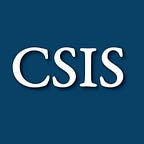The Week at CSIS: The Speeches, Discussions, and Events from May 30th to May 1st
CSIS hosts over 2,000 events a year, from major public speeches to small briefings. Join us here for an inside look at the events of the week.
5.30: Confronting the Global Forced Migration Crisis: Report Launch
CSIS hosted an event to launch CSIS’s new report on confronting the global forced migration crisis. The report contains the findings of a high level, bi-partisan task force and consolidates field research in Bangladesh, Jordan, Senegal, Sweden, Switzerland, Turkey, Uganda, and cities across the United States including Dallas, Detroit, Los Angeles, and San Diego. It is in the U.S. domestic and national security interests to confront these issues abroad now to mitigate greater challenges later; this report illustrates the complex crisis, why it is important, and what we can do about it.
5.30: The Malaysian Election Tsunami: What Happens Next?
The CSIS Southeast Asia Program hosted a panel discussion featuring Dr. Meredith L. Weiss and Ambassador Joseph Y. Yun, discussing the outcomes of 14th Malaysian general election, and what the election means for the state of democracy in Malaysia and the region.
5.30: Money, Corruption, and Politics: Getting at the Roots of Transnational Crime
CSIS hosted a panel of experts to discuss Professor Evan Ellis’ most recent book, Transnational Crime in Latin America and the Caribbean. Ellis, a Professor of Latin American Studies at the U.S. Army War College, argued that “instead of attacking symptoms, policymakers must focus on the relationships between the interdependent phenomena in the whole system, and how to selectively intervene in affect those relationships.”
5.30: Schieffer Series: The Cancelled Trump-Kim Summit?
Hosted by CBS News legend and CSIS Trustee Bob Schieffer, Korea expert Victor Cha reflected on the current state of affairs between the U.S. and North Korea, and possibility of peace on the Korean peninsula.
5.31: CFIUS Reform: Will the Bill Make a Difference?
CSIS hosted a timely discussion on the powers of the Committee on Foreign Investment in the United States (CFIUS), and its potential increase in scope if a bill on foreign investments passes Congress. The current bill is designed to expand CFIUS’ powers in overseeing foreign investments with the potential to compromise national security. Particularly it is aimed at reducing foreign acquisition of sensitive U.S. technologies and intellectual property, a threat coming mainly from China.
5.31: Our Year of War: Two Brothers, Vietnam, and a Nation Divided
CSIS hosted a book launch for Our Year of War, which shares the story of Chuck Hagel, who went on to become a Nebraska senator for twelve years and Secretary of Defense from 2013 until 2015, and his brother Tom, a law professor at University of Dayton in Ohio since 1982 — men who epitomized the best and lived through the worst. Following the brothers’ paths from the prairie heartland through a war on the far side of the world and back to a splintered America, Our Year of War tells the story of two brothers in battle.
6.01: Foreign Service Nationals: USAID’s Key Partner in Success
Foreign service nationals (FSNs) are local, non-U.S. citizens employed by USAID and the State Department. Many USAID FSNs are extremely qualified, having received advanced degrees in their respective fields and having worked at the most senior levels in government, business or civil society before coming to USAID. They are the largest component of USAID’s workforce and an integral part of USAID’s in-country missions because they speak the local languages and have contacts throughout the country enabling the U.S. Embassy to advance its agenda. CSIS hosted a public panel discussion on the importance role of USAID’s foreign service nationals.
